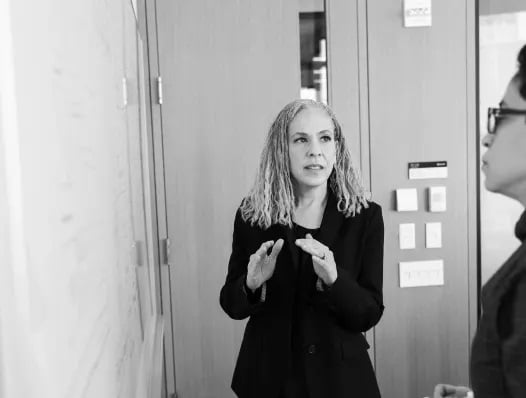Which Psychology Career Is Right for Me?
We take a look at what fields are out there, and how you could kickstart your career in each one.
If you’re considering a move into psychology, it may be that you have a particular specialism in mind. However, it’s also possible that, although you know you are interested in the workings of the mind, you’re still asking yourself which career path is right for you.
There is bound to be a role that suits your passions and interests. So, a good first step is to do your research into the different pathways available.
Below, we take a closer look at some of the most popular careers in psychology, and the steps you’ll need to take to become a Chartered Psychologist in each one (UK).

1. Educational Psychologist
What is an educational psychologist?
Educational psychology is about providing support to children and young people who face challenges in their development due to a disability or issues such as social, behavioural or emotional difficulities.
Who does an educational psychologist work with?
In addition to the young people themselves, you could be working alongside their parents, and teaching and support staff in a range of educational settings.
What does an educational psychologist do?
You’ll be carrying out assessments – from interviews to observations – to assess the situation before recommending actions aimed at improving the young person’s development and wellbeing. Running programmes to improve the lives and education of young people more generally may also be part of your educational psychologist role.
How to become an educational psychologist:
- Gain a British Psychological Society (BPS) accredited Psychology BSc or MSc (conversion) and Graduate Basis for Membership to the BPS (GBC).
- Complete a BPS accredited Doctorate in Educational Psychology.
Top Tip: Having relevant experience in an educational setting or with children will help you to progress in this area.
Gain your BPS accredited MSc and kickstart your educational psychologist career with us – no matter your background.

2. Health Psychologist
What is a health psychologist?
Health psychology is about helping people to manage the psychological and emotional aspects of physical illness. They also support people trying to maintain healthier lifestyles. A health psychologist will advise other healthcare professionals on the psychological impact that ill health can have, improving the services they provide to patients.
Who does a health psychologist work with?
Health psychologists work in a number of environments such as hospitals, community health settings, research units, public health departments or consultancy companies. You’ll work closely with patients and their families, as well as medical professionals (such as GPs, nurses, dieticians and rehabilitation therapists) and health care agents.
What does a health psychologist do?
The role of a health psychologist is varied. Depending on where you work, you’ll be responsible for different tasks, including: raising awareness of the importance of healthy lifestyles; supporting healthcare staff with dealing sensitively with patients; helping patients to cope with illness or addiction; working with authorities to improve health policy or researching how patients and doctors decide upon treatments.
How to become a health psychologist:
- Gain a BPS accredited Psychology BSc or MSc (conversion) and GBC.
- Complete a BPS accredited Masters in Health. Psychology (Stage 1)
- Complete one of the following Stage 2 qualifications:
- The BPS Qualification in Health Psychology Stage 2 (QHP Stage 2).
Or
- A BPS accredited Doctorate in Health Psychology.
Top tip: Stage 2 training comes in different formats, so it’s important to research which is best for you. However, you should always choose a BPS accredited qualification.
Get BPS accredited and step into Health Psychology with our online conversion course.

3. Forensic Psychologist
What is a forensic psychologist?
Forensic psychologists bridge the worlds of psychology and the criminal justice system. In the UK, most are employed by the HM Prison service but they may also be based in universities, forensic labs or research centres.
Who does a forensic psychologist work with?
You’ll largely be engaging with prison, young offenders and probation staff, the police, and legal, health and social professionals, as well as prisoners and victims of crime.
What does a forensic psychologist do?
Armed with a strong understanding of the psychological issues associated with criminal behaviour, having the role of a forensic psychologist could lead to you doing anything from implementing treatment programmes to providing hard research to be used as evidence in court, to advising parole boards and helping with prisoner profiling. You could also work to analyse crimes and reduce the stresses and strains of prisoners and prison staff.
How to become a forensic psychologist:
- Gain a BPS accredited Psychology BSc or MSc (conversion) and GBC.
- After this you must either complete a:
- BPS accredited Masters in Forensic Psychology (Stage 1) then a BPS Qualification in Forensic Psychology Stage 2.
Or
- Doctorate programme in Forensic Psychology.
Launch your forensic career with Northumbria – join our distance learning Masters course.

4. Sports Psychologist
What is a sports psychologist?
The mission of sport psychologists is to help sports people navigate the ups and downs that come with working in their uniquely competitive environment. If your passion for sport and fitness rivals your interest in the human mind, this is a great career.
Who does a sports psychologist work with?
You’ll primarily be working with athletes and other sports professionals, such as referees and coaches.
What does a sports psychologist do?
It will be your job to use psychological theories and techniques to enhance sporting performance. Whether it’s helping to build team spirit in squads or advising professionals on how to deal with the pressures of competing, you’ll play a key part in their success. You’ll be on hand to assist people through the psychological impact of, or depression caused by, injuries too.
How to become a sports psychologist:
- Gain a BPS accredited Psychology BSc or MSc (conversion) and GBC.
- Complete a BPS accredited Masters in Sport and Exercise Psychology (Stage 1).
- Complete one of the following Stage 2 qualifications:
- The BPS Qualification in Sport and Exercise Psychology (Stage 2).
Or
- A BPS accredited Doctorate in Sport and Exercise Psychology.
Top tip: Exercise psychology is closely related to sports psychology, though the responsibilities involved are a little different. An exercise psychologist’s role is concerned with motivating the public to lead healthier, more active lifestyles.
Achieve your goals with our flexible BPS accredited Psychology course.

5. Counselling Psychologist
What is a counselling psychologist?
Counselling psychology aims to apply psychological theory and research to therapeutic practice. Psychologists help people, groups and families to navigate through difficult stages in life (for example relationship breakdowns, abuse or bereavements) or manage mental health conditions (for example depression, psychosis or eating disorders).
Who does a counselling psychologist work with?
It’s likely you’ll be based in a health or mental health setting, such as a hospital or health centre, and interacting with a range of health and social care staff. You’ll also be communicating daily with your clients and their loved ones.
What does a counselling psychologist do?
You’ll assist individuals along the road to recovery or help them live without acute distress. Key responsibilities will include: carrying out assessments, such as mental health needs, risk assessment and psychometric testing; planning and implementing specialist treatments and analysing their outcomes; and working with other professionals to ensure the patient receives a multidisciplinary service that meets their needs.
How to become a counselling psychologist:
- Gain a BPS accredited Psychology BSc or MSc (conversion) and GBC.
- Complete either:
- A BPS accredited Doctorate in Counselling Psychology.
Or
- The BPS Qualification in Counselling Psychology.
Top tip: Counselling psychology requires self awareness and the ability to connect a knowledge of relationship dynamics and communication with a therapeutic context.
Find out more about how our MSc conversion course could help you to fast forward towards life in a counselling psychology.

6. Clinical Psychologist
What is a clinical psychologist?
Clinical psychologists specialise in providing treatment for a range of mental and physical health disorders – from anxiety and depression to learning difficulties. It’s their aim to reduce the level of distress people experience and improve quality of life for patients.
Who does a clinical psychologist work with?
As well as your patients and their loved ones, it’s likely you’ll interact with a wide range of other professionals, including doctors, social workers, health visitors and psychiatrists.
What does a clinical psychologist do?
Working closely with your patients, you will employ psychological methods and research to diagnose, assess and manage their condition. You may be undertaking psychometric tests, interviews or observations to get a better understanding of the situation, before recommending courses of treatment e.g. counselling or therapy.
How to become a clinical psychologist:
- Gain a BPS accredited Psychology BSc or MSc (conversion) and GBC.
- Complete a BPS accredited Doctorate in Clinical Psychology.
Top tip: Most Clinical Psychology Doctorate courses accept applications through the Clearing House for Postgraduate Courses in Clinical Psychology but not all: do your research.
Take the first step to becoming a clincial psychologist with us.

7. Occupational Psychologist
What is an occupational psychologist?
The occupational psychology profession is concerned with the ways in which organisations, and their employees, behave. It’s their task to ensure that people are performing as effectively as possible at work to help drive organisational success. They’re also key in making sure staff are satisfied in their jobs.
Who does an occupational psychologist work with?
You can expect to be based within an office environment, either as a contractor or permanent employee, and working alongside managers and HR professionals, as well as employees.
What does an occupational psychologist do?
You’ll be key in cultivating a business’ culture and keeping employees motivated and happy. You may be involved in:
- Making sure the office environment is maximised to encourage productivity.
- The hiring and assessment of new personnel (for example developing psychometric tests and interview or assessment centre tasks).
- Developing talent management processes, including the development of appraisal systems.
- Providing coaching to help employees achieve their company and personal objectives.
- Helping to drive smooth, effective organisational change.
How to become an occupational psychologist:
- Gain a BPS accredited Psychology BSc or MSc (conversion) and GBC.
- Gain a BPS accredited Masters in Occupational Psychology.
- Complete Stage 2 of the Society’s Qualification in Occupational Psychology (two years supervised practice).
Top tip: Occupational psychologists are found in businesses of all shapes and sizes. It’s worth doing some research and thinking about where you could see yourself working.
Our industry approved conversion course will help you to progress your career in this area.
Learn more about our online Psychology MSc and how it could help you kickstart the psychology career of your dreams by filling in the form below.
Request for information
